An Examination of Interview Research for Mass Media Analysis
VerifiedAdded on 2023/06/10
|8
|2158
|394
Report
AI Summary
This report provides a comprehensive analysis of the interview research method in the context of mass media studies. It begins with an introduction to interview research as a qualitative method, highlighting its importance in understanding the evolving landscape of mass media. The report then delves into the strengths of this method, such as the ability to gather detailed and in-depth information, provide better explanations, and achieve better response rates. Conversely, it also addresses the weaknesses, including social desirability bias, the time-consuming nature of the process, difficulties in data analysis, and the associated costs. The report supports its arguments with examples from academic research, demonstrating the practical application of interview methods in mass media investigations. Overall, the report aims to provide a balanced view of the interview method, enabling a better understanding of its utility and limitations in media research.
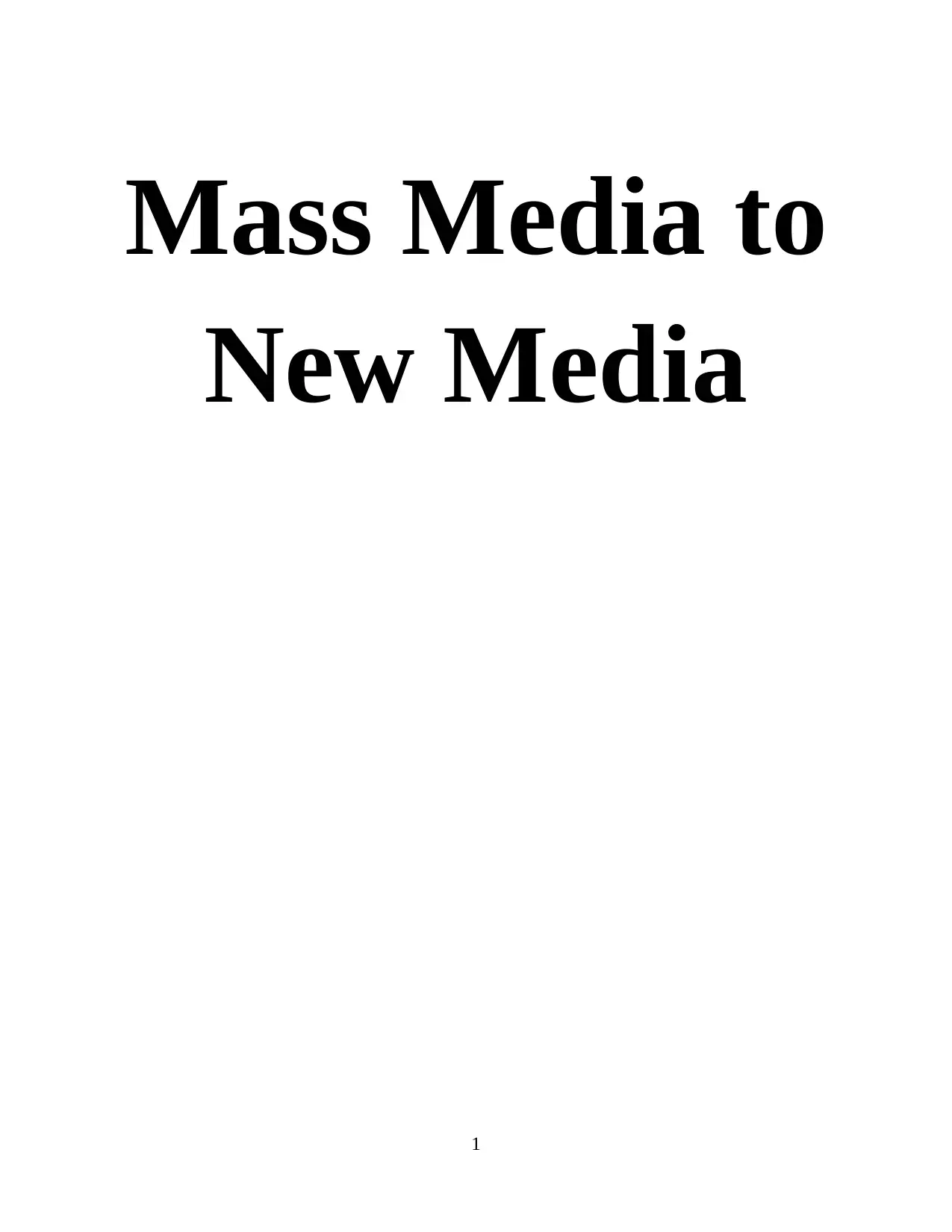
Mass Media to
New Media
1
New Media
1
Paraphrase This Document
Need a fresh take? Get an instant paraphrase of this document with our AI Paraphraser
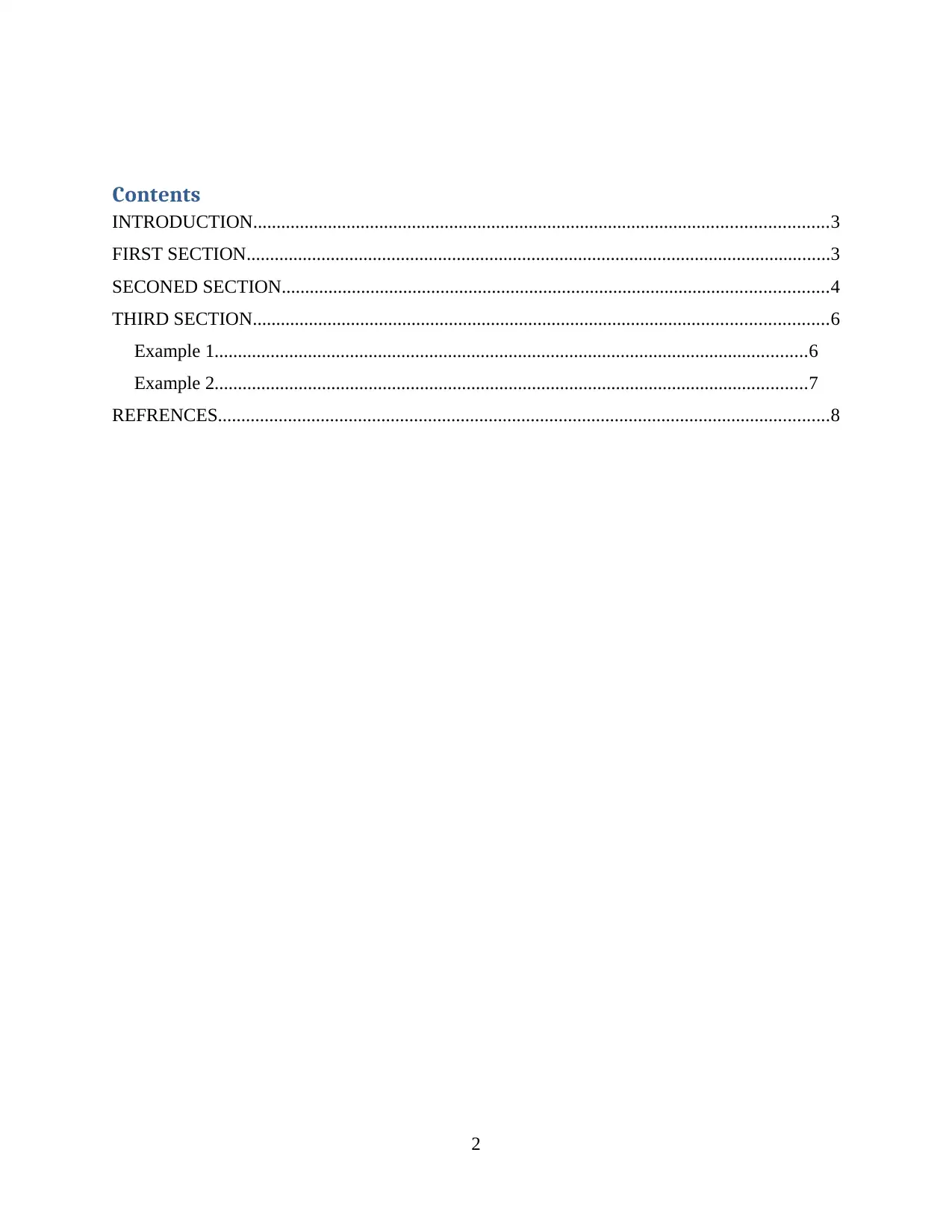
Contents
INTRODUCTION...........................................................................................................................3
FIRST SECTION.............................................................................................................................3
SECONED SECTION.....................................................................................................................4
THIRD SECTION...........................................................................................................................6
Example 1...............................................................................................................................6
Example 2...............................................................................................................................7
REFRENCES...................................................................................................................................8
2
INTRODUCTION...........................................................................................................................3
FIRST SECTION.............................................................................................................................3
SECONED SECTION.....................................................................................................................4
THIRD SECTION...........................................................................................................................6
Example 1...............................................................................................................................6
Example 2...............................................................................................................................7
REFRENCES...................................................................................................................................8
2
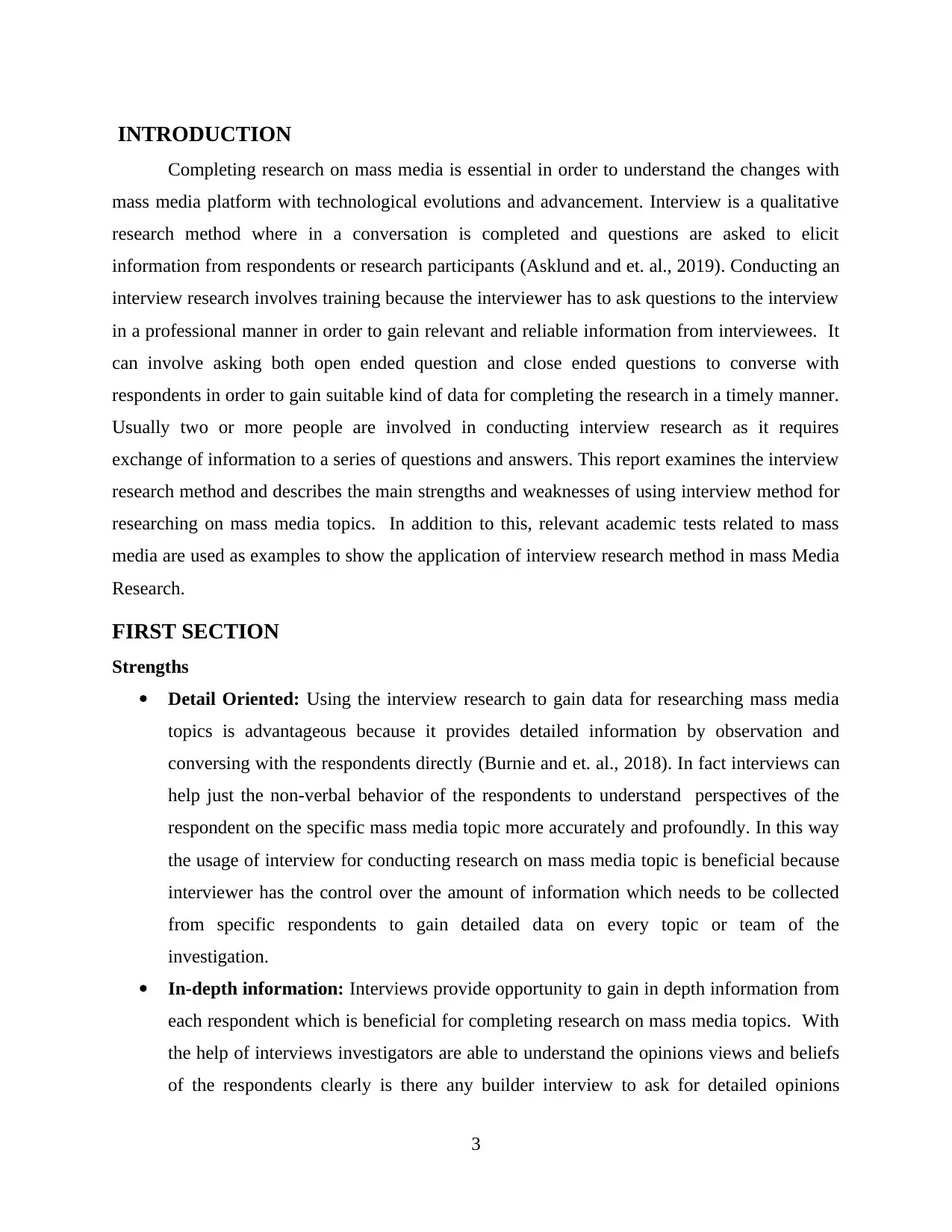
INTRODUCTION
Completing research on mass media is essential in order to understand the changes with
mass media platform with technological evolutions and advancement. Interview is a qualitative
research method where in a conversation is completed and questions are asked to elicit
information from respondents or research participants (Asklund and et. al., 2019). Conducting an
interview research involves training because the interviewer has to ask questions to the interview
in a professional manner in order to gain relevant and reliable information from interviewees. It
can involve asking both open ended question and close ended questions to converse with
respondents in order to gain suitable kind of data for completing the research in a timely manner.
Usually two or more people are involved in conducting interview research as it requires
exchange of information to a series of questions and answers. This report examines the interview
research method and describes the main strengths and weaknesses of using interview method for
researching on mass media topics. In addition to this, relevant academic tests related to mass
media are used as examples to show the application of interview research method in mass Media
Research.
FIRST SECTION
Strengths
Detail Oriented: Using the interview research to gain data for researching mass media
topics is advantageous because it provides detailed information by observation and
conversing with the respondents directly (Burnie and et. al., 2018). In fact interviews can
help just the non-verbal behavior of the respondents to understand perspectives of the
respondent on the specific mass media topic more accurately and profoundly. In this way
the usage of interview for conducting research on mass media topic is beneficial because
interviewer has the control over the amount of information which needs to be collected
from specific respondents to gain detailed data on every topic or team of the
investigation.
In-depth information: Interviews provide opportunity to gain in depth information from
each respondent which is beneficial for completing research on mass media topics. With
the help of interviews investigators are able to understand the opinions views and beliefs
of the respondents clearly is there any builder interview to ask for detailed opinions
3
Completing research on mass media is essential in order to understand the changes with
mass media platform with technological evolutions and advancement. Interview is a qualitative
research method where in a conversation is completed and questions are asked to elicit
information from respondents or research participants (Asklund and et. al., 2019). Conducting an
interview research involves training because the interviewer has to ask questions to the interview
in a professional manner in order to gain relevant and reliable information from interviewees. It
can involve asking both open ended question and close ended questions to converse with
respondents in order to gain suitable kind of data for completing the research in a timely manner.
Usually two or more people are involved in conducting interview research as it requires
exchange of information to a series of questions and answers. This report examines the interview
research method and describes the main strengths and weaknesses of using interview method for
researching on mass media topics. In addition to this, relevant academic tests related to mass
media are used as examples to show the application of interview research method in mass Media
Research.
FIRST SECTION
Strengths
Detail Oriented: Using the interview research to gain data for researching mass media
topics is advantageous because it provides detailed information by observation and
conversing with the respondents directly (Burnie and et. al., 2018). In fact interviews can
help just the non-verbal behavior of the respondents to understand perspectives of the
respondent on the specific mass media topic more accurately and profoundly. In this way
the usage of interview for conducting research on mass media topic is beneficial because
interviewer has the control over the amount of information which needs to be collected
from specific respondents to gain detailed data on every topic or team of the
investigation.
In-depth information: Interviews provide opportunity to gain in depth information from
each respondent which is beneficial for completing research on mass media topics. With
the help of interviews investigators are able to understand the opinions views and beliefs
of the respondents clearly is there any builder interview to ask for detailed opinions
3
⊘ This is a preview!⊘
Do you want full access?
Subscribe today to unlock all pages.

Trusted by 1+ million students worldwide
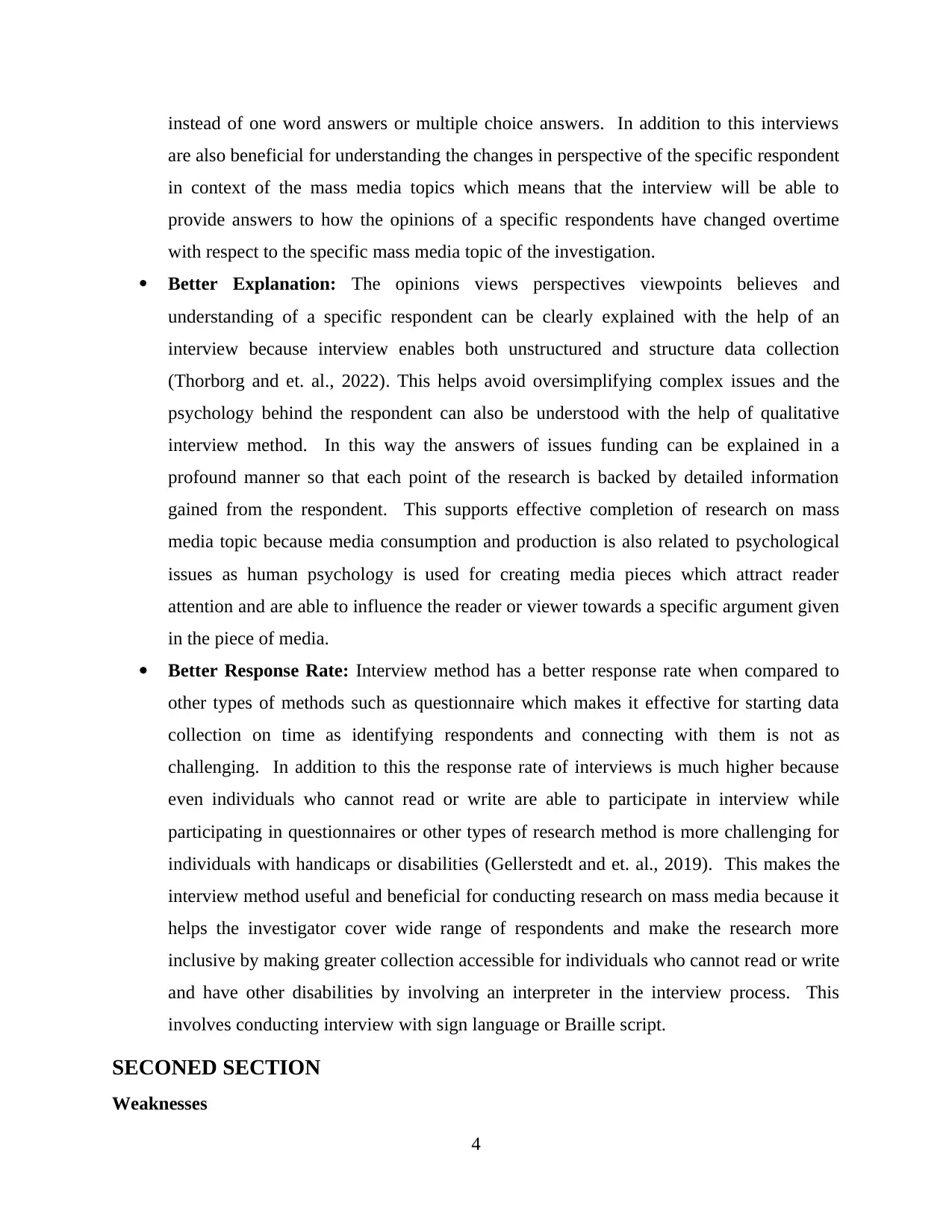
instead of one word answers or multiple choice answers. In addition to this interviews
are also beneficial for understanding the changes in perspective of the specific respondent
in context of the mass media topics which means that the interview will be able to
provide answers to how the opinions of a specific respondents have changed overtime
with respect to the specific mass media topic of the investigation.
Better Explanation: The opinions views perspectives viewpoints believes and
understanding of a specific respondent can be clearly explained with the help of an
interview because interview enables both unstructured and structure data collection
(Thorborg and et. al., 2022). This helps avoid oversimplifying complex issues and the
psychology behind the respondent can also be understood with the help of qualitative
interview method. In this way the answers of issues funding can be explained in a
profound manner so that each point of the research is backed by detailed information
gained from the respondent. This supports effective completion of research on mass
media topic because media consumption and production is also related to psychological
issues as human psychology is used for creating media pieces which attract reader
attention and are able to influence the reader or viewer towards a specific argument given
in the piece of media.
Better Response Rate: Interview method has a better response rate when compared to
other types of methods such as questionnaire which makes it effective for starting data
collection on time as identifying respondents and connecting with them is not as
challenging. In addition to this the response rate of interviews is much higher because
even individuals who cannot read or write are able to participate in interview while
participating in questionnaires or other types of research method is more challenging for
individuals with handicaps or disabilities (Gellerstedt and et. al., 2019). This makes the
interview method useful and beneficial for conducting research on mass media because it
helps the investigator cover wide range of respondents and make the research more
inclusive by making greater collection accessible for individuals who cannot read or write
and have other disabilities by involving an interpreter in the interview process. This
involves conducting interview with sign language or Braille script.
SECONED SECTION
Weaknesses
4
are also beneficial for understanding the changes in perspective of the specific respondent
in context of the mass media topics which means that the interview will be able to
provide answers to how the opinions of a specific respondents have changed overtime
with respect to the specific mass media topic of the investigation.
Better Explanation: The opinions views perspectives viewpoints believes and
understanding of a specific respondent can be clearly explained with the help of an
interview because interview enables both unstructured and structure data collection
(Thorborg and et. al., 2022). This helps avoid oversimplifying complex issues and the
psychology behind the respondent can also be understood with the help of qualitative
interview method. In this way the answers of issues funding can be explained in a
profound manner so that each point of the research is backed by detailed information
gained from the respondent. This supports effective completion of research on mass
media topic because media consumption and production is also related to psychological
issues as human psychology is used for creating media pieces which attract reader
attention and are able to influence the reader or viewer towards a specific argument given
in the piece of media.
Better Response Rate: Interview method has a better response rate when compared to
other types of methods such as questionnaire which makes it effective for starting data
collection on time as identifying respondents and connecting with them is not as
challenging. In addition to this the response rate of interviews is much higher because
even individuals who cannot read or write are able to participate in interview while
participating in questionnaires or other types of research method is more challenging for
individuals with handicaps or disabilities (Gellerstedt and et. al., 2019). This makes the
interview method useful and beneficial for conducting research on mass media because it
helps the investigator cover wide range of respondents and make the research more
inclusive by making greater collection accessible for individuals who cannot read or write
and have other disabilities by involving an interpreter in the interview process. This
involves conducting interview with sign language or Braille script.
SECONED SECTION
Weaknesses
4
Paraphrase This Document
Need a fresh take? Get an instant paraphrase of this document with our AI Paraphraser
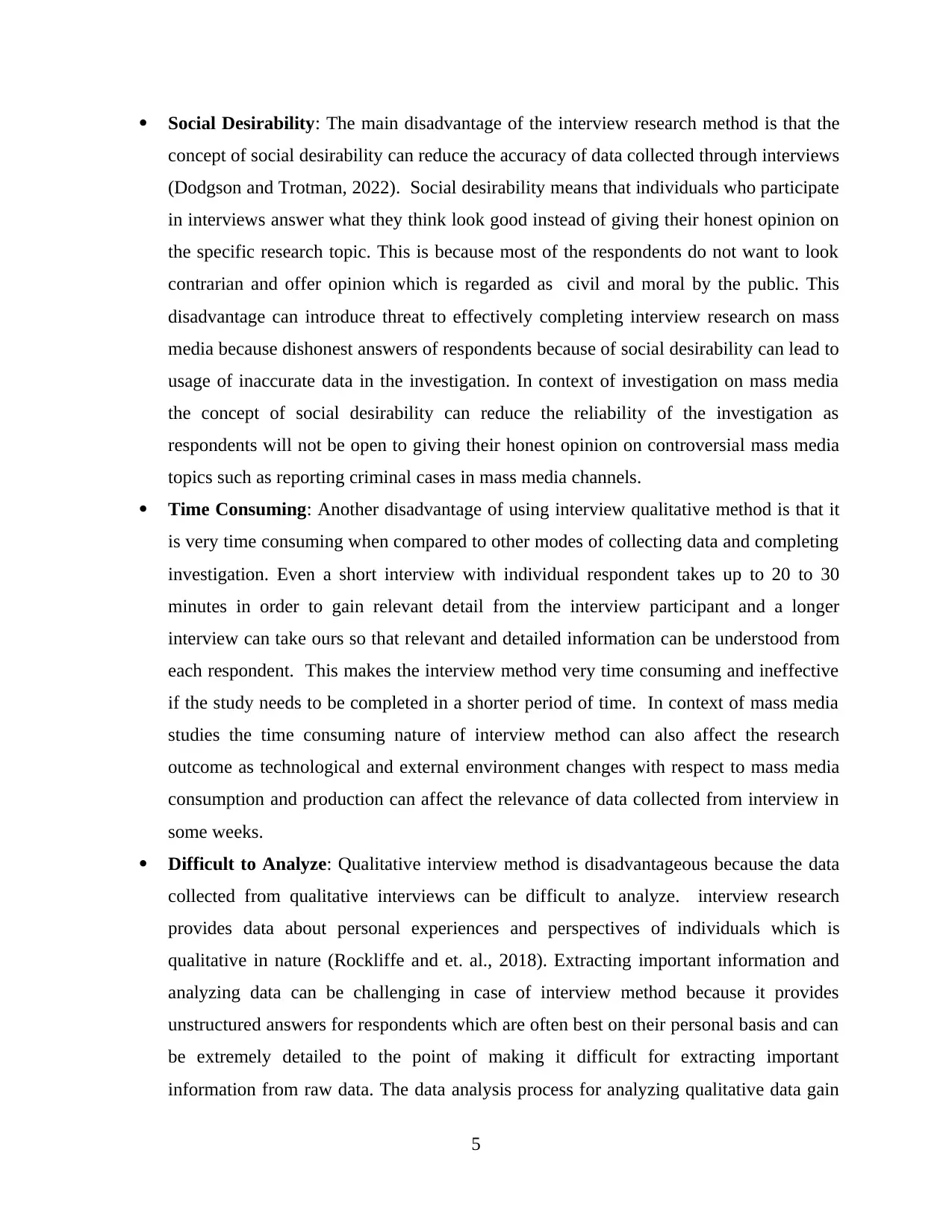
Social Desirability: The main disadvantage of the interview research method is that the
concept of social desirability can reduce the accuracy of data collected through interviews
(Dodgson and Trotman, 2022). Social desirability means that individuals who participate
in interviews answer what they think look good instead of giving their honest opinion on
the specific research topic. This is because most of the respondents do not want to look
contrarian and offer opinion which is regarded as civil and moral by the public. This
disadvantage can introduce threat to effectively completing interview research on mass
media because dishonest answers of respondents because of social desirability can lead to
usage of inaccurate data in the investigation. In context of investigation on mass media
the concept of social desirability can reduce the reliability of the investigation as
respondents will not be open to giving their honest opinion on controversial mass media
topics such as reporting criminal cases in mass media channels.
Time Consuming: Another disadvantage of using interview qualitative method is that it
is very time consuming when compared to other modes of collecting data and completing
investigation. Even a short interview with individual respondent takes up to 20 to 30
minutes in order to gain relevant detail from the interview participant and a longer
interview can take ours so that relevant and detailed information can be understood from
each respondent. This makes the interview method very time consuming and ineffective
if the study needs to be completed in a shorter period of time. In context of mass media
studies the time consuming nature of interview method can also affect the research
outcome as technological and external environment changes with respect to mass media
consumption and production can affect the relevance of data collected from interview in
some weeks.
Difficult to Analyze: Qualitative interview method is disadvantageous because the data
collected from qualitative interviews can be difficult to analyze. interview research
provides data about personal experiences and perspectives of individuals which is
qualitative in nature (Rockliffe and et. al., 2018). Extracting important information and
analyzing data can be challenging in case of interview method because it provides
unstructured answers for respondents which are often best on their personal basis and can
be extremely detailed to the point of making it difficult for extracting important
information from raw data. The data analysis process for analyzing qualitative data gain
5
concept of social desirability can reduce the accuracy of data collected through interviews
(Dodgson and Trotman, 2022). Social desirability means that individuals who participate
in interviews answer what they think look good instead of giving their honest opinion on
the specific research topic. This is because most of the respondents do not want to look
contrarian and offer opinion which is regarded as civil and moral by the public. This
disadvantage can introduce threat to effectively completing interview research on mass
media because dishonest answers of respondents because of social desirability can lead to
usage of inaccurate data in the investigation. In context of investigation on mass media
the concept of social desirability can reduce the reliability of the investigation as
respondents will not be open to giving their honest opinion on controversial mass media
topics such as reporting criminal cases in mass media channels.
Time Consuming: Another disadvantage of using interview qualitative method is that it
is very time consuming when compared to other modes of collecting data and completing
investigation. Even a short interview with individual respondent takes up to 20 to 30
minutes in order to gain relevant detail from the interview participant and a longer
interview can take ours so that relevant and detailed information can be understood from
each respondent. This makes the interview method very time consuming and ineffective
if the study needs to be completed in a shorter period of time. In context of mass media
studies the time consuming nature of interview method can also affect the research
outcome as technological and external environment changes with respect to mass media
consumption and production can affect the relevance of data collected from interview in
some weeks.
Difficult to Analyze: Qualitative interview method is disadvantageous because the data
collected from qualitative interviews can be difficult to analyze. interview research
provides data about personal experiences and perspectives of individuals which is
qualitative in nature (Rockliffe and et. al., 2018). Extracting important information and
analyzing data can be challenging in case of interview method because it provides
unstructured answers for respondents which are often best on their personal basis and can
be extremely detailed to the point of making it difficult for extracting important
information from raw data. The data analysis process for analyzing qualitative data gain
5
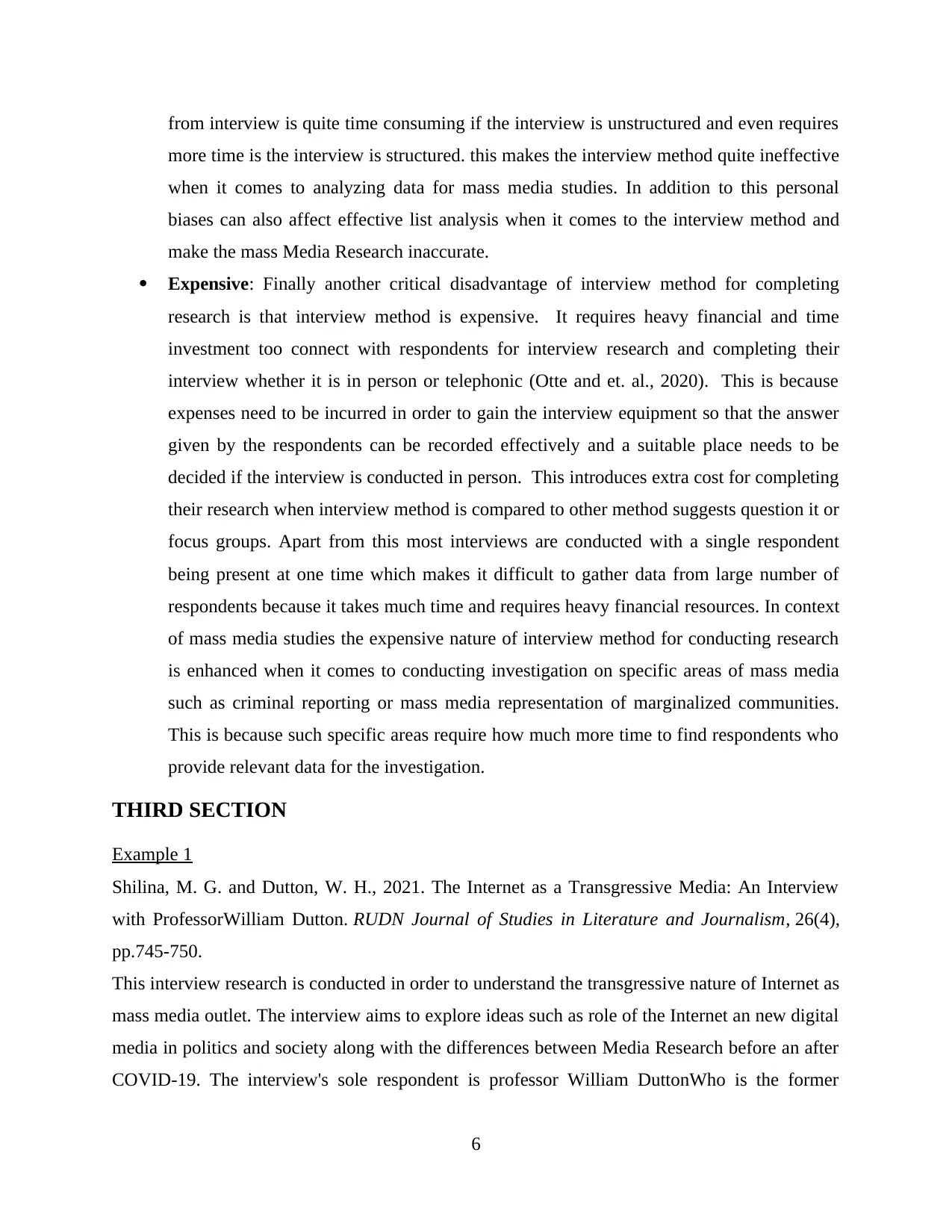
from interview is quite time consuming if the interview is unstructured and even requires
more time is the interview is structured. this makes the interview method quite ineffective
when it comes to analyzing data for mass media studies. In addition to this personal
biases can also affect effective list analysis when it comes to the interview method and
make the mass Media Research inaccurate.
Expensive: Finally another critical disadvantage of interview method for completing
research is that interview method is expensive. It requires heavy financial and time
investment too connect with respondents for interview research and completing their
interview whether it is in person or telephonic (Otte and et. al., 2020). This is because
expenses need to be incurred in order to gain the interview equipment so that the answer
given by the respondents can be recorded effectively and a suitable place needs to be
decided if the interview is conducted in person. This introduces extra cost for completing
their research when interview method is compared to other method suggests question it or
focus groups. Apart from this most interviews are conducted with a single respondent
being present at one time which makes it difficult to gather data from large number of
respondents because it takes much time and requires heavy financial resources. In context
of mass media studies the expensive nature of interview method for conducting research
is enhanced when it comes to conducting investigation on specific areas of mass media
such as criminal reporting or mass media representation of marginalized communities.
This is because such specific areas require how much more time to find respondents who
provide relevant data for the investigation.
THIRD SECTION
Example 1
Shilina, M. G. and Dutton, W. H., 2021. The Internet as a Transgressive Media: An Interview
with ProfessorWilliam Dutton. RUDN Journal of Studies in Literature and Journalism, 26(4),
pp.745-750.
This interview research is conducted in order to understand the transgressive nature of Internet as
mass media outlet. The interview aims to explore ideas such as role of the Internet an new digital
media in politics and society along with the differences between Media Research before an after
COVID-19. The interview's sole respondent is professor William DuttonWho is the former
6
more time is the interview is structured. this makes the interview method quite ineffective
when it comes to analyzing data for mass media studies. In addition to this personal
biases can also affect effective list analysis when it comes to the interview method and
make the mass Media Research inaccurate.
Expensive: Finally another critical disadvantage of interview method for completing
research is that interview method is expensive. It requires heavy financial and time
investment too connect with respondents for interview research and completing their
interview whether it is in person or telephonic (Otte and et. al., 2020). This is because
expenses need to be incurred in order to gain the interview equipment so that the answer
given by the respondents can be recorded effectively and a suitable place needs to be
decided if the interview is conducted in person. This introduces extra cost for completing
their research when interview method is compared to other method suggests question it or
focus groups. Apart from this most interviews are conducted with a single respondent
being present at one time which makes it difficult to gather data from large number of
respondents because it takes much time and requires heavy financial resources. In context
of mass media studies the expensive nature of interview method for conducting research
is enhanced when it comes to conducting investigation on specific areas of mass media
such as criminal reporting or mass media representation of marginalized communities.
This is because such specific areas require how much more time to find respondents who
provide relevant data for the investigation.
THIRD SECTION
Example 1
Shilina, M. G. and Dutton, W. H., 2021. The Internet as a Transgressive Media: An Interview
with ProfessorWilliam Dutton. RUDN Journal of Studies in Literature and Journalism, 26(4),
pp.745-750.
This interview research is conducted in order to understand the transgressive nature of Internet as
mass media outlet. The interview aims to explore ideas such as role of the Internet an new digital
media in politics and society along with the differences between Media Research before an after
COVID-19. The interview's sole respondent is professor William DuttonWho is the former
6
⊘ This is a preview!⊘
Do you want full access?
Subscribe today to unlock all pages.

Trusted by 1+ million students worldwide
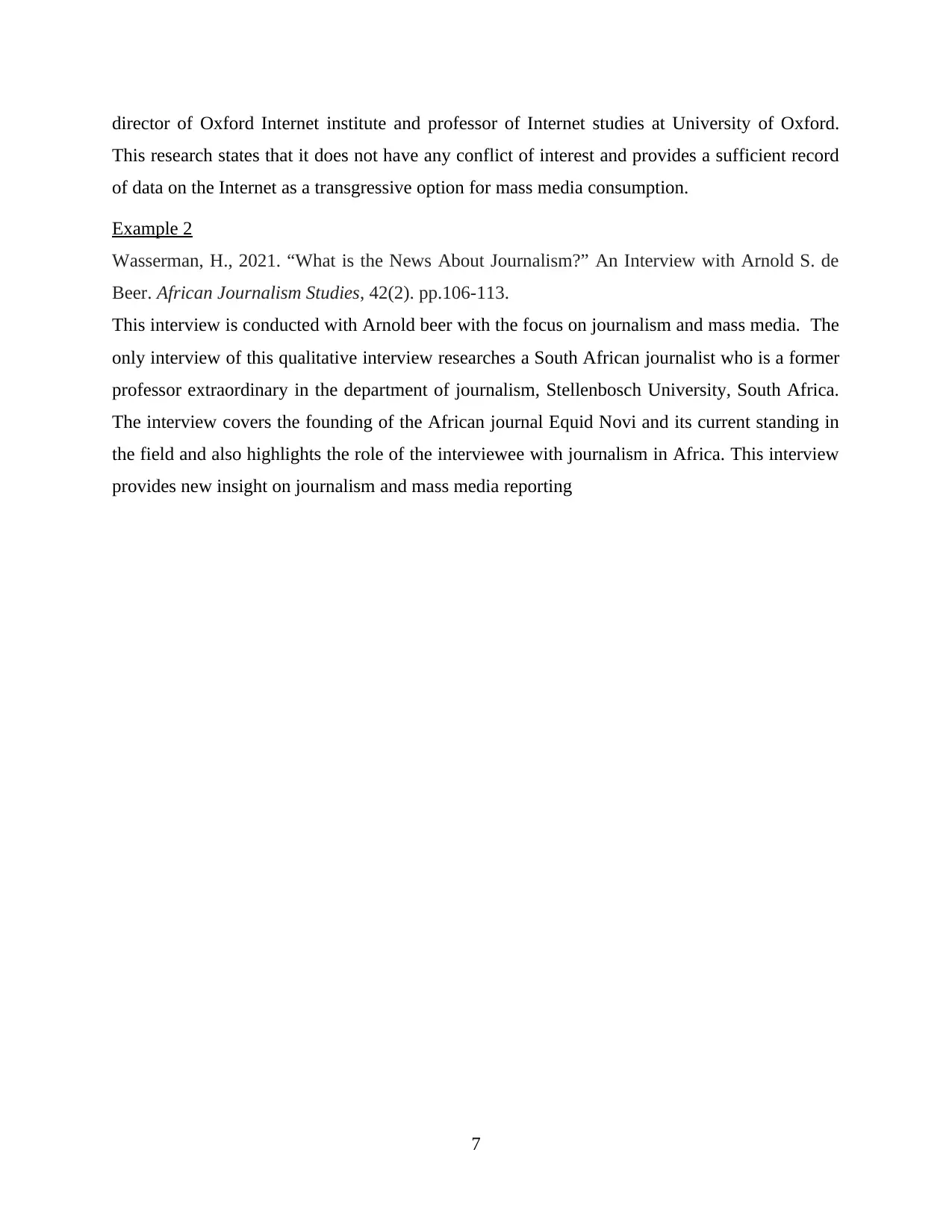
director of Oxford Internet institute and professor of Internet studies at University of Oxford.
This research states that it does not have any conflict of interest and provides a sufficient record
of data on the Internet as a transgressive option for mass media consumption.
Example 2
Wasserman, H., 2021. “What is the News About Journalism?” An Interview with Arnold S. de
Beer. African Journalism Studies, 42(2). pp.106-113.
This interview is conducted with Arnold beer with the focus on journalism and mass media. The
only interview of this qualitative interview researches a South African journalist who is a former
professor extraordinary in the department of journalism, Stellenbosch University, South Africa.
The interview covers the founding of the African journal Equid Novi and its current standing in
the field and also highlights the role of the interviewee with journalism in Africa. This interview
provides new insight on journalism and mass media reporting
7
This research states that it does not have any conflict of interest and provides a sufficient record
of data on the Internet as a transgressive option for mass media consumption.
Example 2
Wasserman, H., 2021. “What is the News About Journalism?” An Interview with Arnold S. de
Beer. African Journalism Studies, 42(2). pp.106-113.
This interview is conducted with Arnold beer with the focus on journalism and mass media. The
only interview of this qualitative interview researches a South African journalist who is a former
professor extraordinary in the department of journalism, Stellenbosch University, South Africa.
The interview covers the founding of the African journal Equid Novi and its current standing in
the field and also highlights the role of the interviewee with journalism in Africa. This interview
provides new insight on journalism and mass media reporting
7
Paraphrase This Document
Need a fresh take? Get an instant paraphrase of this document with our AI Paraphraser
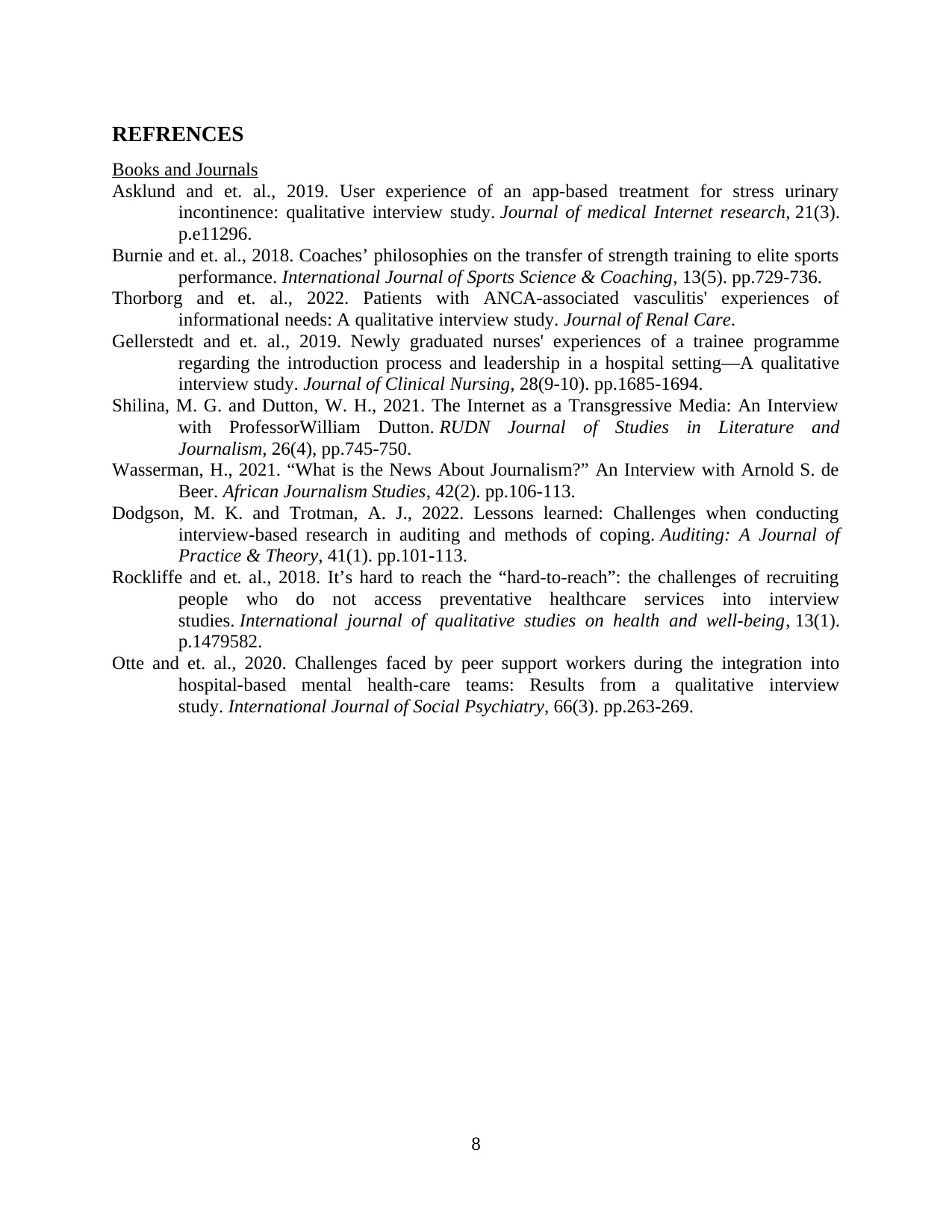
REFRENCES
Books and Journals
Asklund and et. al., 2019. User experience of an app-based treatment for stress urinary
incontinence: qualitative interview study. Journal of medical Internet research, 21(3).
p.e11296.
Burnie and et. al., 2018. Coaches’ philosophies on the transfer of strength training to elite sports
performance. International Journal of Sports Science & Coaching, 13(5). pp.729-736.
Thorborg and et. al., 2022. Patients with ANCA‐associated vasculitis' experiences of
informational needs: A qualitative interview study. Journal of Renal Care.
Gellerstedt and et. al., 2019. Newly graduated nurses' experiences of a trainee programme
regarding the introduction process and leadership in a hospital setting—A qualitative
interview study. Journal of Clinical Nursing, 28(9-10). pp.1685-1694.
Shilina, M. G. and Dutton, W. H., 2021. The Internet as a Transgressive Media: An Interview
with ProfessorWilliam Dutton. RUDN Journal of Studies in Literature and
Journalism, 26(4), pp.745-750.
Wasserman, H., 2021. “What is the News About Journalism?” An Interview with Arnold S. de
Beer. African Journalism Studies, 42(2). pp.106-113.
Dodgson, M. K. and Trotman, A. J., 2022. Lessons learned: Challenges when conducting
interview-based research in auditing and methods of coping. Auditing: A Journal of
Practice & Theory, 41(1). pp.101-113.
Rockliffe and et. al., 2018. It’s hard to reach the “hard-to-reach”: the challenges of recruiting
people who do not access preventative healthcare services into interview
studies. International journal of qualitative studies on health and well-being, 13(1).
p.1479582.
Otte and et. al., 2020. Challenges faced by peer support workers during the integration into
hospital-based mental health-care teams: Results from a qualitative interview
study. International Journal of Social Psychiatry, 66(3). pp.263-269.
8
Books and Journals
Asklund and et. al., 2019. User experience of an app-based treatment for stress urinary
incontinence: qualitative interview study. Journal of medical Internet research, 21(3).
p.e11296.
Burnie and et. al., 2018. Coaches’ philosophies on the transfer of strength training to elite sports
performance. International Journal of Sports Science & Coaching, 13(5). pp.729-736.
Thorborg and et. al., 2022. Patients with ANCA‐associated vasculitis' experiences of
informational needs: A qualitative interview study. Journal of Renal Care.
Gellerstedt and et. al., 2019. Newly graduated nurses' experiences of a trainee programme
regarding the introduction process and leadership in a hospital setting—A qualitative
interview study. Journal of Clinical Nursing, 28(9-10). pp.1685-1694.
Shilina, M. G. and Dutton, W. H., 2021. The Internet as a Transgressive Media: An Interview
with ProfessorWilliam Dutton. RUDN Journal of Studies in Literature and
Journalism, 26(4), pp.745-750.
Wasserman, H., 2021. “What is the News About Journalism?” An Interview with Arnold S. de
Beer. African Journalism Studies, 42(2). pp.106-113.
Dodgson, M. K. and Trotman, A. J., 2022. Lessons learned: Challenges when conducting
interview-based research in auditing and methods of coping. Auditing: A Journal of
Practice & Theory, 41(1). pp.101-113.
Rockliffe and et. al., 2018. It’s hard to reach the “hard-to-reach”: the challenges of recruiting
people who do not access preventative healthcare services into interview
studies. International journal of qualitative studies on health and well-being, 13(1).
p.1479582.
Otte and et. al., 2020. Challenges faced by peer support workers during the integration into
hospital-based mental health-care teams: Results from a qualitative interview
study. International Journal of Social Psychiatry, 66(3). pp.263-269.
8
1 out of 8
Related Documents
Your All-in-One AI-Powered Toolkit for Academic Success.
+13062052269
info@desklib.com
Available 24*7 on WhatsApp / Email
![[object Object]](/_next/static/media/star-bottom.7253800d.svg)
Unlock your academic potential
Copyright © 2020–2026 A2Z Services. All Rights Reserved. Developed and managed by ZUCOL.





